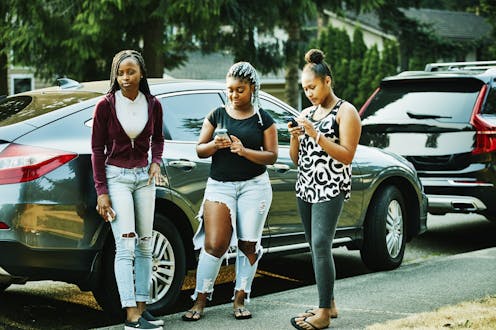Facebook has known for a year and a half that Instagram is bad for teens despite claiming otherwise – here are the harms researchers have been documenting for years
- Written by Christia Spears Brown, Professor of Psychology, University of Kentucky

Facebook officials had internal research in March 2020 showing that Instagram – the social media platform most used by adolescents[1] – is harmful to teen girls’ body image and well-being but swept those findings under the rug to continue conducting business as usual, according to a Sept. 14, 2021, Wall Street Journal report[2].
Facebook’s policy of pursuing profits regardless of documented harm has sparked comparisons to Big Tobacco, which knew in the 1950s that its products were carcinogenic[3] but publicly denied it into the 21st century. Those of us who study social media use in teens didn’t need a suppressed internal research study to know that Instagram can harm teens. Plenty of peer-reviewed research papers show the same thing.
Understanding the impact of social media on teens is important because almost all teens go online daily. A Pew Research Center poll shows that 89% of teens report they are online “almost constantly” or “several times a day[4].”
Teens are more likely to log on to Instagram than any other social media site. It is a ubiquitous part of adolescent life. Yet studies consistently show that the more often teens use Instagram, the worse their overall well-being, self-esteem, life satisfaction, mood and body image[5]. One study found that the more college students used Instagram on any given day, the worse their mood and life satisfaction was that day[6].
Unhealthy comparisons
But Instagram isn’t problematic simply because it is popular. There are two key features of Instagram that seem to make it particularly risky. First, it allows users to follow both celebrities and peers, both of whom can present a manipulated, filtered picture of an unrealistic body along with a highly curated impression of a perfect life.
While all social media allows users to be selective in what they show the world, Instagram is notorious for its photo editing and filtering capabilities. Plus, that is the platform popular among celebrities, models and influencers. Facebook has been relegated to the uncool soccer moms and grandparents. For teens, this seamless integration of celebrities and retouched versions of real-life peers presents a ripe environment for upward social comparison, or comparing yourself to someone who is “better” in some respect.
Humans, as a general rule, look to others to know how to fit in and judge their own lives. Teens are especially vulnerable to these social comparisons. Just about everyone can remember worrying about fitting in in high school. Instagram exacerbates that worry. It is hard enough to compare yourself to a supermodel who looks fantastic (albeit filtered); it can be even worse when the filtered comparison is Natalie down the hall.
Negatively comparing themselves to others leads people to feel envious[7] of others’ seemingly better lives and bodies. Recently, researchers even tried to combat this effect by reminding Instagram users that the posts were unrealistic[8].
It didn’t work. Negative comparisons, which were nearly impossible to stop, still led to envy and lowered self-esteem. Even in studies in which participants knew the photos they were shown on Instagram were retouched and reshaped, adolescent girls still felt worse about their bodies[9] after viewing them. For girls who tend to make a lot of social comparisons, these effects are even worse.
Objectification and body image
Instagram is also risky for teens because its emphasis on pictures of the body leads users to focus on how their bodies look to others. Our research shows that for teen girls – and increasingly teen boys – thinking about their own bodies as the object of a photo increases worrying thoughts about how they look to others[10], and that leads to feeling shame about their bodies. Just taking a selfie to be posted later makes them feel worse about how they look to others.
Being an object for others to view doesn’t help the “selfie generation” feel empowered and sure of themselves – it can do exactly the opposite. These are not insignificant health concerns, because body dissatisfaction during the teen years is a powerful and consistent predictor of later eating disorder symptoms[11].
[Over 100,000 readers rely on The Conversation’s newsletter to understand the world. Sign up today[12].]
Facebook has acknowledged internally what researchers have been documenting for years: Instagram can be harmful to teens. Parents can help[13] by repeatedly talking to their teens about the difference between appearance and reality, by encouraging their teens to interact with peers face-to-face, and to use their bodies in active ways instead of focusing on the selfie.
The big question will be how Facebook handles these damaging results. History and the courts have been less than forgiving of the head-in-the-sand approach of Big Tobacco.
References
- ^ most used by adolescents (www.pewresearch.org)
- ^ Wall Street Journal report (www.wsj.com)
- ^ knew in the 1950s that its products were carcinogenic (www.who.int)
- ^ 89% of teens report they are online “almost constantly” or “several times a day (www.pewresearch.org)
- ^ worse their overall well-being, self-esteem, life satisfaction, mood and body image (doi.org)
- ^ worse their mood and life satisfaction was that day (doi.org)
- ^ leads people to feel envious (dx.doi.org)
- ^ reminding Instagram users that the posts were unrealistic (doi.org)
- ^ felt worse about their bodies (doi.org)
- ^ increases worrying thoughts about how they look to others (doi.org)
- ^ predictor of later eating disorder symptoms (doi.org)
- ^ Sign up today (theconversation.com)
- ^ Parents can help (www.mayoclinic.org)
















